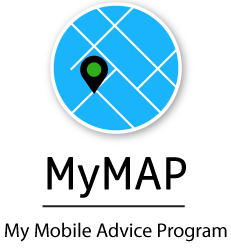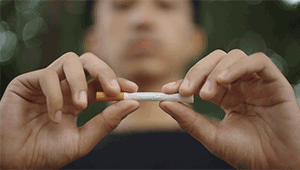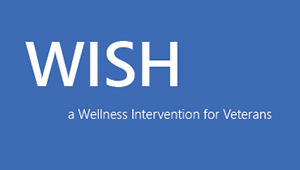Quit-Smoking Research
Kaiser Permanente Washington Health Research Institute (KPWHRI) has been studying how to help people stop smoking since the 1980s. Our research has helped change the way quit-smoking treatment is delivered and paid for nationwide, not just at Kaiser Permanente Washington.
Want to learn more about our research?
Here is a selection of a few of our studies:
Tobacco use can be harmful, especially for people living with HIV. The GEMS+ Study extends our prior work to help us understand if a novel mobile health app designed for people living with HIV can help smokers change their smoking habits when they are ready to do so.
Recruitment for this study is now closed.
Which is more effective for helping people with chronic health issues make healthy lifestyle changes and quit smoking: standard care offered by the Department of Veterans Affairs (VA) or a novel, remotely delivered wellness program? This randomized trial funded by the National Cancer Institute seeks to find out. The research is a collaborative partnership between KPWHRI and researchers at VA of Puget Sound and University of California, Davis.
Recruitment is ongoing and by invitation only.
Will people who aren’t yet ready to quit smoking use a mobile health (mHealth) app to help them learn how to cut back or stop smoking? And if they do, will it help change their behavior? The GEMS study will provide important preliminary data to begin to answer these questions.
Recruitment for this study is now closed.
Key publications:
- McClure JB, Heffner JL, Krakauer C, Mun S, Klasnja P, Catz SL. Feasibility, Acceptability, and Potential Impact of a Novel mHealth App for Smokers Ambivalent About Quitting: Randomized Pilot Study. JMIR Mhealth Uhealth. 2023 Jun 28;11:e46155. View article.

The Oral Health 4 Life study looked at the effects of integrating an oral health promotion program into standard care offered through state-funded tobacco quitlines. Results from this large, randomized, semi-pragmatic trial suggested that promoting oral health in conjunction with tobacco cessation may help smokers give up tobacco. The intervention did not increase use of professional dental care, it but did improve smokers’ daily oral hygiene (brushing and flossing).
Key publications:
- McClure JB, Bush T, Anderson ML, Blasi P, Thompson E, Nelson J & Catz SL. Oral Health 4 Life: A randomized semi-pragmatic trial evaluating a novel oral health promotion and smoking cessation program delivered via tobacco quitlines. 2018 Am J Public Health. 108(5):689-695. Epub 2018 Mar 22. View article.
- McClure JB, Anderson M, Krakauer C, Blasi P, Bush T, Nelson J, & Catz SL. Impact of a novel oral health promotion program on routine oral hygiene among socio-economically disadvantaged smokers: Results from a randomized semi-pragmatic trial. Translational Behavioral Medicine. Epub ahead of print 2019 Feb 12.
- McClure JB, Blasi, P, Bush T, Fishman P, Nelson J, Anderson ML, Cook A, & Catz S. Oral Health 4 Life: Design and methods of a semi-pragmatic randomized trial to promote oral health care and smoking abstinence among tobacco quitline callers. 2017 Contemporary Clinical Trials, 57: 90-97. Epub April 13, 2017. View article.
- Blasi PR, Krakauer C, Anderson ML, Nelson J, Bush T, Catz SL and McClure JB (2018). Factors Associated with Future Dental Care Utilization Among Low-Income Smokers Overdue for Dental Visits. BMC Oral Health, 18(1): 183. View article.

My Mobile Advice Program (MyMAP) evaluated a new smart phone app developed by researchers at Kaiser Permanente Washington Health Research Institute, the University of California, and the University of Michigan. The program was designed to support smoking cessation and improve participants medication adherence.
Key publication:
- McClure JB, Anderson, ML, Bradley K, An L, & Catz SL. Evaluating an adaptive and interactive mHealth smoking cessation and medication adherence program: A randomized pilot feasibility study. 2016 JMIR mHealth and uHealth, 4(3), e94. View article.

Partnering to Achieve Tobacco-free Health (PATH) was a joint study between Kaiser Permanente Washington Health Research Institute and the Fred Hutchinson Cancer Research Center. This clinical trial compared compare how well different types of group-based counseling work to help people quit smoking.
Key publication:
- McClure JB, Bricker J, Mull K, and Heffner JL. Comparative-effectiveness of group-delivered Acceptance and Commitment Therapy vs. Cognitive Behavioral Therapy for smoking cessation: A randomized controlled trial. 2018 Nicotine & Tobacco Research. Epub ahead of print 2018 Dec 24.

What content and design features are important to include in online smoking cessation programs to make them more effective? That’s the question the Questions about Quitting (Q2) study addressed. Q2 was a collaboration between researchers at Kaiser Permanente Washington Health Research Institute and the University of Michigan. More than 1,800 Kaiser Permanente Washington members participated in this innovative study, which the National Cancer Institute funded.
Key publications:
- McClure JB, Peterson D, Derry H, Riggs K, Saint-Johnson J, Nair V, Shortreed SM. Exploring the “active ingredients” of an online smoking intervention: A randomized factorial trial. Nicotine & Tobacco Research. 2014 Aug;16(8):1129-39. Epub 2014 Apr 11. View article summary at PubMed.
- McClure JB, Shortreed, S Bogart, A Derry, H Riggs, K St. John, J Nair, V, An L. The effect of program design on engagement with an Internet-based smoking intervention: Randomized factorial trial. Journal of Medical Internet Research. 2013 Mar 25;15(3). View article.
![]()
The BEACON study looked at whether it is possible to offer people different treatment (stop-smoking medicine and counseling) based on their genes. Results from this pilot study showed that not only was it possible to do this, but the treatment was well accepted. This study was a collaboration between researchers at Kaiser Permanente Washington Health Research Institute and Stanford University.
Key publication:
- McClure JB, Swan GE, St. John J, Fauver R, Javitz H, Bergen A, Nishita D, Niaura R, Munafo M, David S. Pharmacogenetic smoking cessation intervention in a health care setting: A pilot feasibility study. Nicotine & Tobacco Research. 2013 Feb;15(2):518-26. Epub 2012 Sep 4. View article summary at PubMed.

The Step Up trial was a pilot project that evaluated the preliminary effectiveness of combining counseling for depression, physical activity, and quitting smoking into a single phone-delivered intervention. The results demonstrated the approach warrants further research in a larger randomized trial.
Key publication:
- McClure JB, Catz SL, Ludman EJ, Richards J, Riggs K, Grothaus, L. Feasibility and acceptability of a multiple risk factor intervention: The Step Up randomized pilot trial. BMC Public Health. 2011 Mar 17;11:167. View article.

The COMPASS trial compared three different forms of behavioral counseling (phone counseling, Web-based counseling, and phone + web counseling) to determine which was more effective when combined with Chantix® (varenicline). Phone counseling appeared to do better during early treatment, but long-term stop smoking rates did not differ. All three programs were effective when combined with varenicline. The study also examined Chantix side effects and found they were generally mild to moderate for most smokers.
Key publications:
- Swan GE, McClure JB, Jack LM, Zbikowski SM, Javitz HS, Catz SL, Deprey M, Richards J, McAfee TA. Behavioral counseling and varenicline treatment for smoking cessation. American Journal of Preventive Medicine. 2010 May;38(5):482-90. View article summary at PubMed.
- McClure JB, Swan GE, Catz SL, Jack L, Javitz H, McAfee T, Deprey M, Richards J, Zbikowski SM. Smoking outcome by psychiatric history after behavioral and varenicline treatment. Journal of Substance Abuse Treatment. 2010 Jun;38(4):394-402. Epub 2010 Apr 2. View article summary at PubMed.
- McClure JB, Swan GE, Jack L, Catz SL, Zbikowski SM, McAfee TA, Deprey M, Richards J, Javitz H. Mood, side-effects and smoking outcomes among persons with and without probable lifetime depression taking varenicline. Journal of General Internal Medicine. 2009 24(5):563-9. Epub 2009 Feb 24. View article at PubMed.
- Javitz H, Zbikowski S, Deprey M, McAfee T, McClure JB, Richards J, Catz S, Jack L, Swan G. Cost-effectiveness of varenicline and three different behavioral treatment formats for smoking cessation. Translational Behavioral Medicine: Practice, Policy, and Research. 2011 Mar 1;1(1):182-190. View article summary at PubMed.
- Halperin AC, McAfee TA, Jack LM, Catz SL, McClure JB, Deprey TM, Richards J, Zbikowski SM, Swan GE. Impact of symptoms experienced by varenicline users on tobacco treatment in a real world setting. Journal of Substance Abuse Treatment. 2009 Jun;36(4):428-34. Epub 2008 Nov 11. View article summary at PubMed.
Want to volunteer for a study?
We often seek Kaiser Permanente Washington members and others to help us evaluate new treatment programs. To learn more about quit-smoking studies that are seeking volunteers, please contact Sophia Mun.
Research

Digital tool could help people change smoking habits
A mobile application designed to engage smokers who are ambivalent about quitting shows promising results.
Live Healthy

Quitting smoking: Practice makes perfect
Jennifer McClure, PhD, who leads KPWHRI's tobacco studies, offers tips on how to recommit if you slip after you quit.





